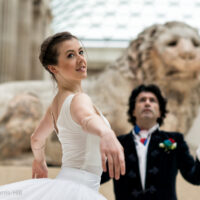Chess, like love, like music, has the power to make men (and women) happy.
—Siegbert Tarrasch, The Game of Chess (1931)
Music is my first love and I have always had an affinity for chess, a sense of harmony and the similarities between music, ballet and chess. It is a combination to inspire and inform children of the importance of coordinating together and moving forward in the future.
In 2015 I established the concept of the Queen’s Journey to encourage more women and girls to play chess. Through music, ballet and chess the Queen’s Journey educates and entertains in equal measures. In addition to being a fun and social activity, chess improves the players’ generic life skills by developing their logical thinking, situational awareness and planning ahead, as well as their communication skills. Music, ballet and chess are gender-neutral activities that connect people through time and space. They are a profound medium of communication that has no barriers of language, age, gender, ethnicity, religion, physical ability or social status.
Since its establishment, the Queen’s Journey has toured in the United Kingdom and internationally including the United States and Hungary in various events promoting equality and encouraging women and girls to play chess as a means of building life skills that help them to be strong, look forward and strive towards their own goals. Thanks to its pioneering concept i.e. educating and entertaining through music and ballet the Queen’s Journey can adopt different themes and be always relevant.
So far, the performances have included a ballet-chess music production at the British Museum in 2015 as well as a brief history of the evolution of the queen and an explanation of how chess can inspire.
I believe that ballet is a way to encourage girls to make their moves on the chessboard and would like to see more girls to be involved in chess. In 2016 the theme of the Queen’s Journey was “power and grace” to mark the Queen’s 64 years in reign. This included the printing of a 3D chess queen design project to inform and inspire more girls to see chess from different and new exciting perspectives.
To illustrate the power of women and girls supporting one another the theme in 2017 was “chess connects”. This included a special artistic moment at Judit Polgar’s Global Chess festival in a format of a human display in which eight chess queens danced on a giant chess board following their own paths and without obstructing each other (see video).
In 2018, the Queen’s Journey toured under the theme “empowerment” to celebrate the 100 year anniversary of women’s rights and empowerment in the United Kingdom. The piano performances that year included “1000 Faces of Chess” and “Music Mosaic” at Judit Polgar’s Global Chess festival’s opening ceremony and directing a chess-themed ballet performance at Holland Park, London.
The Queen’s Journey concept of empowerment has been especially popular in Nordic countries. This year at Norway Chess in Stavanger and at the ‘Heart of Finland’ chess ceremonies, I performed the world premier of the “Queen of the Knight” based on Philidor’s “Princess of Norway”.
In 2020 there will be a ballet and chess performance of ‘Alice through the Looking Glass’ at the Victoria and Albert Museum celebrating the ‘perfect vision’ of Alice as she looks and moves forward finally becoming a Queen.
Each game of chess is like a new melody which beautifully resolves at the end of a journey. I hope by using a combination of chess, music and ballet we can inspire and inform children, specifically Chess Queens, the importance of coordinating together in the future.
As a proud Goodwill Ambassador of Artistic Values of Chess awarded by Judit Polgar, I hope to continue the themes of female empowerment. The visual aesthetic, melody and movement remind us that the game is always greater than the player.
Jason Kouchak is a classical pianist and composer based in London and Paris. He has performed worldwide in the United States, Europe and Japan. Find out more at ChessBallet.
Source: London chess conference



 Skype
Skype Messenger
Messenger Viber
Viber Contact form
Contact form






